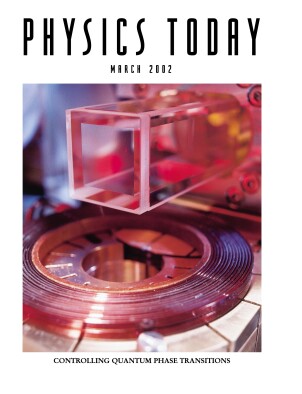APS to Present Awards in Albuquerque
DOI: 10.1063/1.2408467
One of the highlights of the April meeting of the American Physical Society in Albuquerque, New Mexico, will be the presentation of several prizes and awards.
The 2002 Hans A. Bethe Prize will go to Gordon Baym, Center for Advanced Study Professor of Physics at the University of Illinois at Urbana-Champaign. APS is honoring Baym for his “superb synthesis of fundamental concepts which have provided an understanding of matter at extreme conditions, ranging from crusts and interiors of neutron stars to matter at ultrahigh temperature.”
J. David Bowman will receive the Tom W. Bonner Prize in recognition of his “leadership in performing precision measurements involving tests of fundamental symmetries, including his studies of parity non-conservation in compound nuclei.” Bowman is a team leader in the neutron science and technology group at Los Alamos National Laboratory.
This year’s Edward A. Bouchet Award will be presented to Oliver Keith Baker, a professor of physics at Hampton University in Virginia and, jointly, a staff scientist at the Thomas Jefferson National Accelerator Facility. He is being praised by the society for his “contribution to nuclear and particle physics; for building the infrastructure required for construction of advanced particle detectors; and for being active in outreach activities, both locally and nationally.”
The Joseph A. Burton Forum Award will go to Adrian Melott, a professor of physics and astronomy at the University of Kansas. APS is recognizing Melott for his “outstanding efforts in helping to restore evolution and cosmology to their proper place in the K–12 scientific curriculum.” The citation also notes that, as both a “distinguished cosmologist and respected member of the clergy,” he played a key role in helping to reverse the Kansas State Board of Education’s antiscience action.
Michael B. Green and John H. Schwarz will share the 2002 Dannie Heinemann Prize, given jointly by APS and the American Institute of Physics. Both recipients were chosen for their “pioneering work in the development of superstring theory.” Green is John Humphrey Plummer Professor in the department of applied mathematics and theoretical physics at the University of Cambridge, in the UK, and Schwarz is Harold Brown Professor of Theoretical Physics at Caltech.
The Dissertation in Nuclear Physics Award will go this year to Jiunn-Wei Chen, a research associate in the physics department of the University of Maryland, College Park, for his “outstanding contributions to the development and application of effective field theory to two-nucleon systems.” Chen’s dissertation adviser was Martin Savage, associate professor of physics at the University of Washington.
The W. K. H. Panofsky Prize will honor three researchers who have provided “compelling experimental evidence for neutrino oscillations using atmospheric neutrinos.” The cowinners are Masatoshi Koshiba, professor emeritus of physics at the University of Tokyo; Yoji Totsuka, director of the Kamioka Observatory in the Institute for Cosmic Ray Research at the University of Tokyo; and Takaaki Kajita, who, like Totsuka, is a professor at the Institute for Cosmic Ray Research.
James Cederberg, Whittier Professor of Science at St. Olaf College in Northfield, Minnesota, will receive the Prize to a Faculty Member for Research in an Undergraduate Institution for his “sustained and productive research in molecular beam spectroscopy” and his “extraordinary record of spurring interest in careers in physics through student participation in challenging experiments.”
Alberto Sirlin, a professor of physics at New York University, and William J. Marciano, a senior physicist at Brookhaven National Laboratory, are cowinners of the J. J. Sakurai Prize. They are being honored for their “pioneering work on radiative corrections, which made precision electroweak studies a powerful method of probing the standard model and searching for new physics.”
Bruce Knuteson, McCormick Fellow at the University of Chicago, will garner the 2002 Mitsuyoshi Tanaka Dissertation Award for his “development of the innovative SLEUTH algorithm, and its successful application to a sensitive search for new phenomena in high-energy interactions at the D0 Experiment at the Fermilab Tevatron.” According to the citation, “The results of this work have the potential for changing fundamentally the way that particle physicists approach searches for new physics.” Knuteson’s dissertation adviser was Mark Strovink, professor of physics at the University of California, Berkeley.
The 2002 Leo Szilard Lectureship Award will be presented to Henry C. Kelly for his “exceptional efforts in informing and shaping government policy in arms control, the environment, information technology, and energy policy while serving at the Solar Energy Research Institute, the Congressional Office of Technology Assessment, and the White House Office of Science and Technology Policy.” Kelly is president of the Federation of American Scientists in Washington, DC.
Alexander N. Skrinsky, director of the Budker Institute of Nuclear Physics at the Russian Academy of Sciences in Novosibirsk, will receive the 2002 Robert R. Wilson Prize for his “major contribution to the invention and development of electron cooling and for his development and for his contributions to the physics of the electron-positron colliders at the Budker Institute.”




